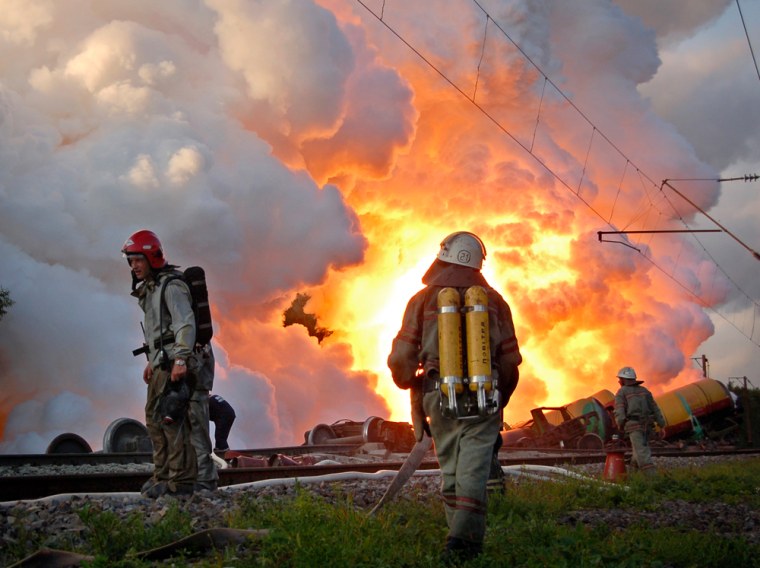A freight train derailed in Ukraine, releasing a cloud of toxic gas and that poisoned at least 20 people, authorities said Tuesday — an accident that touched nerves still raw more than two decades after the Chernobyl nuclear power plant disaster.
Hundreds of people were evacuated and others fled their homes on their own after the derailment sparked a blaze in a cargo of yellow phosphorous, creating a cloud of gas that affected 14 villages in the former Soviet republic.
Twenty people were poisoned and hospitalized, Defense Ministry spokesman Ihor Halyavinsky said. He said their lives were not in danger, and authorities later said that six of them had been released, but media reports said other people in the area sought medical help because of giddiness and vomiting.
"A disaster has happened. After the Chernobyl catastrophe we are dealing with (another) case that can pose a real threat for our people," said Deputy Prime Minister Oleksandr Kuzmuk, who traveled to the area in the Lviv region. "It is an extraordinary event, the consequences of which cannot be predicted."
He later backtracked on the remark, and other officials were at pains to stress that the situation was under control and the danger minimal.
'No threat' to lives
"The cloud of a toxic gas dispersed and there is no threat for people's lives," said Ihor Krol, spokesman for the Emergency Situations Ministry.
The train, en route from Kazakhstan to Poland, derailed near the city of Lviv, which is not far from the Polish border, and 15 of its 58 cars overturned, Krol said. Six of them caught fire and the poison cloud spread over a 35-square mile area containing 14 villages, he said.
Television footage showed firefighters in masks and heavy gear spraying wreckage that sent up thick, choking smoke as a fire glowed orange in the background.
Rescuers extinguished the fire in the highly toxic substance, which can catch fire spontaneously on contact with air at temperatures higher than 104 degrees. It can cause liver damage if consumed.
Emergency workers sprinkled contaminated land with soda and sand and tried to cool off the cars, Krol said.
Local residents were advised to stay inside, not to use water from wells, eat vegetables from their gardens or drink the milk produced by their cows. Of the 11,000 people living in the contaminated area, 815 were evacuated, Krol said.
Confusion in villages
Media reports said that other people had left the villages amid uncertainty about the effects of the accident.
On independent Channel 5 television, an elderly woman and a middle-aged man in one of the affected villages — neither identified — said that authorities had not told them how to respond to the accident.
"Doctors did not come to our village. I only saw advice about what to do on TV," the woman said.
Concerns about the government response and instruction following accidents still lingers from the 1986 explosion and fire at the Chernobyl plant in Ukraine, then a Soviet republic. The Soviet government kept the world's worst civilian nuclear accident under wraps for days and played down the disaster long afterward.
Transport Minister Mykola Rudkovsky said a commission was working at the scene to determine the cause of the railroad accident.
A criminal case was opened, which is standard practice in former Soviet republics, and state railway agency director Volodymyr Kozak said sabotage had been ruled out as the cause.
Phosphorus compounds are chiefly used in fertilizers, although they are important components of pesticides, toothpaste, detergents as well as explosives and fireworks.
